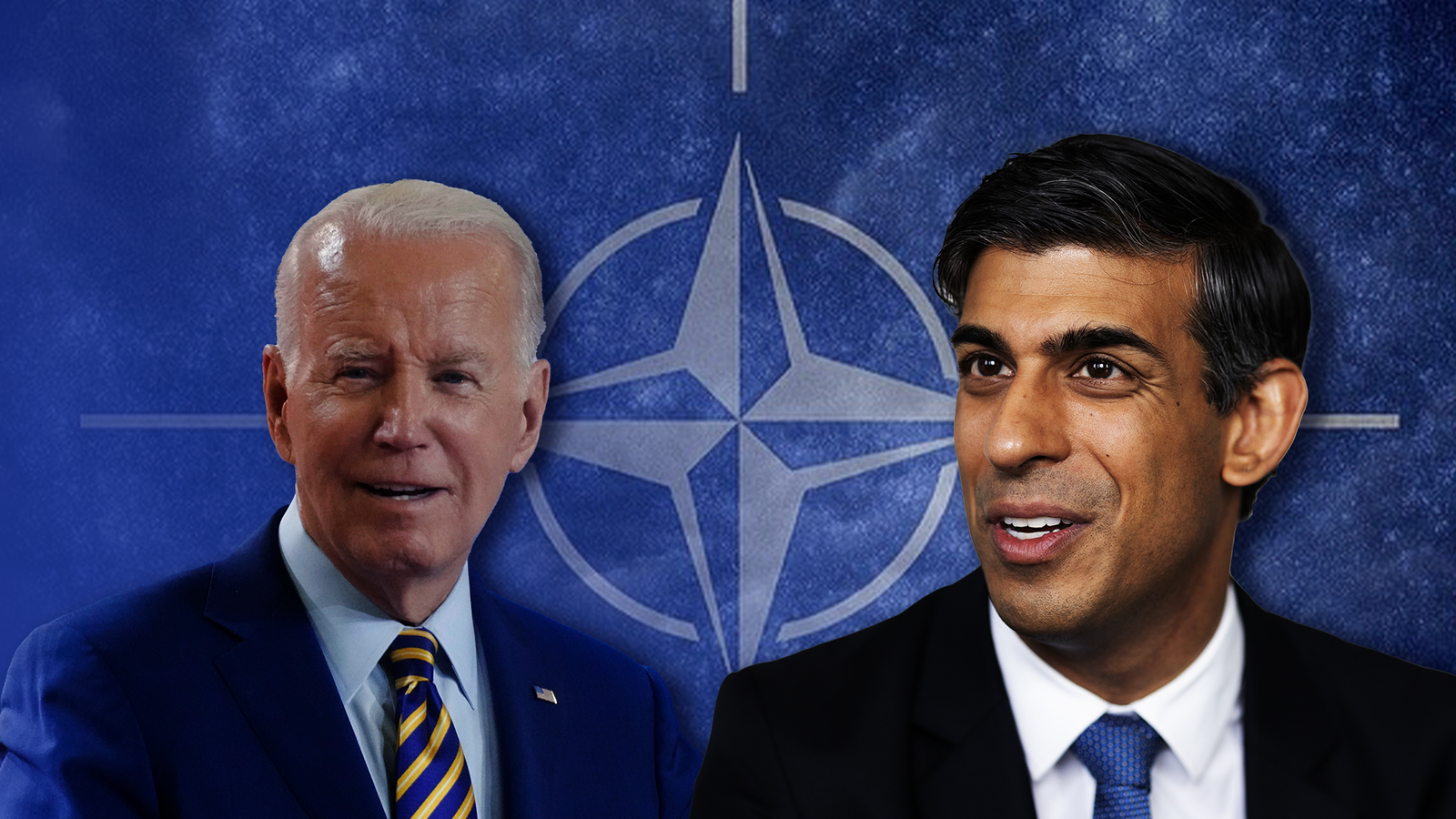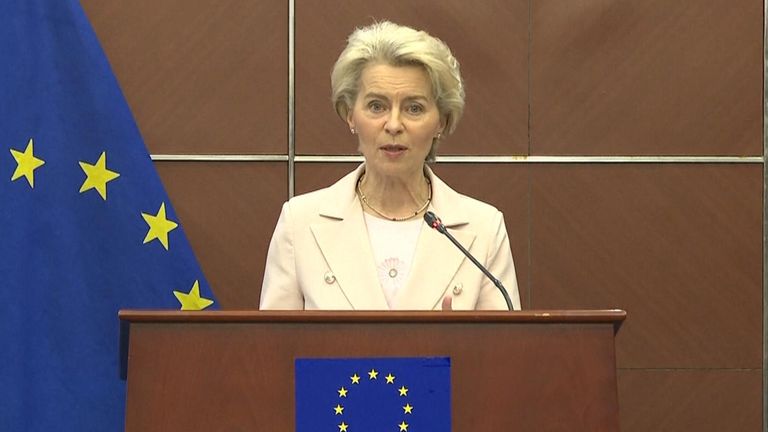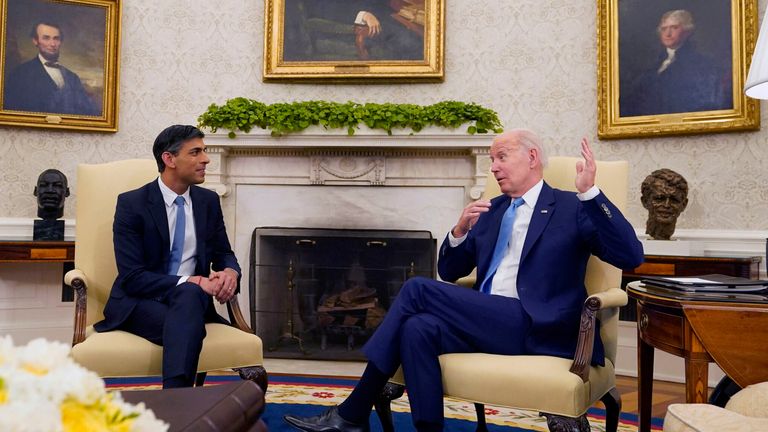Monday will mark the sixth meeting between Prime Minister Rishi Sunak and US President Joe Biden – and their seventh encounter in all as both were at official functions for the funeral of Queen Elizabeth II last September during the Liz Truss interregnum.
The president did not attend the King’s Coronation – that is normal practice. None of his predecessors did either.
Yet, in this heavily scrutinised social media age, he is anxious to pay his respects to King Charles III, head of state to head of state.
His visit to Windsor Castle on Monday will be the highlight of his brief stay in the UK.
No joint press conference or major public statement is planned with either the prime minister or the King.
Perhaps this is just as well since Biden has struggled with Sunak’s name in the past and called him “Mr President” the last time they met.
The two administrations issued unsurprising statements in advance of the Sunak-Biden date.
Number 10 said it “reflects the strong relationship between the US and the UK”.
White House Press Secretary Karine Jean-Pierre explained the president is coming to London “to further strengthen the close relationship between our two nations”.
What seems to irk some British political leaders is that the US is treating the UK as it treats its other major allies in Europe. They don’t feel anything “special” about it.
In the last few days the former cabinet minister Sir Jacob Rees Mogg has been muttering about “the decayed state of the special relationship” after the failed candidacy of Defence Secretary Ben Wallace to be the next secretary general of NATO and the emergence of the European Commission President Ursula von der Leyen as the favourite.
For all the neurotic energy with which those involved in British politics scrutinise transatlantic relations, there is little special about Biden’s visit here.
Nordic natter
The US president usually slots in some bi-lateral business alongside his presence at multi-national conferences and celebrations.
The main item on Biden’s five-day European swing is the Ukraine-urgent NATO Summit in Vilnius, Lithuania, next Tuesday and Wednesday.
Sunak is missing PMQs for a second week running to be there too.
Biden’s last stop before flying home on Thursday will be Helsinki, Finland, for a “US-Nordic Leaders Summit”.
Finland recently abandoned neutrality to join NATO. Sweden is trying to do the same but is being blocked by Turkey. Both countries have long land borders with Russia.
At their meeting in Washington DC in advance of the summits, Biden told the Swedish Prime Minister Ulf Kristersson that he “is anxiously looking forward to your membership”.
With some support from his fellow strongman leader Viktor Orban of Hungary, Turkey’s president Recep Tayyip Erdogan is vetoing Sweden’s bid, claiming the country is a haven for Kurdish separatists.
Underlining its continuing role as the dominant force in European geopolitics, the US is the only country with significant leverage over Erdogan.
Biden will authorise the supply of F-16 fighter jets to Turkey in exchange for a green light to Sweden. The US Congress is insisting Turkey must blink first.
Sweden will rank with Ukraine as the most vital issue on the agenda in Vilnius, although chances of an immediate breakthrough are being played down.
F-16 diplomacy may also have played a part in Biden’s reluctance to back Wallace for NATO, in spite of appeals from Sunak at their bilateral meeting in the White House last month.
Wallace has been consistently in the lead advocating military support for Ukraine.
The US has been more cautious, even though in material terms it continues to be by far the largest supplier of assistance.
UK forces are not equipped with American-made F-16s.
Wallace still got ahead of US policy when he urged countries which have the fighters to supply them to the Ukrainian war effort and proposed setting up F-16 training programmes for Ukrainian pilots in this country.
Historically, most notably in two world wars, the UK has often found itself asking the US to commit more to a conflict.
The UK has secured the leadership of NATO when the two countries have been most closely in sync. The first Secretary General, Lord Hastings Ismay, was Winston Churchill’s military advisor during the Second World War.
In 1984 former Foreign Secretary Peter Carrington secured the post at the height of the mutual admiration between Margaret Thatcher and Ronald Reagan.
Tony Blair had similarly close relations with Bill Clinton when George Robertson took over in 1999, even though the prime minister had successfully leant on the president to send forces to the Balkans.
Now is not such a time.
American disappointment
NATO was set up as a defensive alliance during the period of reconstruction following the Second World War. It currently has 31 member nations.
By convention an American holds the top military post of SACEUR – Supreme Allied Commander Europe.
A European is NATO secretary general, the organisations civilian leader and chief diplomat – subject to American agreement.
With three British secretary generals so far, the UK is already in joint first place with the Netherlands.
Belgium and Italy have had two successful nominations.
Germany, Spain, Denmark and Norway have had one each. All 15 secretary generals have been men.
The pattern of diplomatic traffic was interrupted by the COVID pandemic.
Britain also had to deal with the consequences of leaving the EU: both the perception that it was no longer a reliable ally and America’s disappointment that the UK could no longer be its “bridge” into Europe.
The maverick styles of Boris Johnson and Liz Truss caused further dislocation. Sunak has restored normality successfully and the US has responded.
Sunak met the president when they both took part in meetings of the G20, G7 and the trilateral AUKUS defence summit in California.
Biden also attended events of special importance here such as Queen Elizabeth II’s funeral and the 25th Anniversary of the Good Friday agreement.
He said he went to Belfast “to make sure the Brits didn’t screw around”.
The president gave Sunak full credit for the Windsor Framework. There is no evidence that “Irish” Joe Biden held Ben Wallace’s tours of duty as an Army Officer during the Troubles in Northern Ireland against him.
Read more
Sunak ‘discourages’ use of cluster bombs after Biden agrees to send them to Ukraine
Sunak has not seen ‘rejected’ Home Office emergency migration brake plans, No 10 says
NATO vacancy
Biden aside, Wallace has been telling friends for months that current international relations made it most unlikely that he or any other British citizen would get the NATO job this time.
Ms von der Leyen is not yet an official candidate but she fits the bill.
The one year extension given to Secretary General Jens Stoltenberg means that her first term in Brussels will be coming to an end just as the NATO vacancy arises.
At just under six years, she was the longest serving German defence minister this century, although some have derided her performance.
She is medically qualified and has seven children. Fluent in French, German and English she has built strong working relationships with leaders including Biden and French President Emmanuel Macron.
There has never been a French secretary general because France has opted in and out of NATO’s central command.
Ukraine has changed Macron’s view that NATO was “brain dead”. Now he is insisting that the next secretary general must come from an EU member state, as has been the case until now.
By the end of next week it should be clear whether Ms von der Leyen is the runaway frontrunner for NATO or whether she wants a second term leading the European Commission.
A shift in the balance of power in next year’s European Parliament election could call that option into question.
When NATO leaders meet for their celebratory 75th Anniversary Summit in Washington DC over a year from now the war in Ukraine will be in a completely different place from where it is today.
Sweden may have become a NATO member by then. Europe may even be having to make its own plans for a potential second Donald Trump presidency, as Biden and Sunak face difficult elections.
Whatever job she goes for, Ms von der Leyen’s political future will look a lot more certain than theirs.
Looking towards 2024 there is little need to get over-excited about Sunak meeting Biden, again on Monday.



